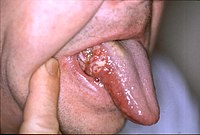
Photo from wikipedia
OBJECTIVES A range of interventions have been tested to improve oral health of older people. We performed a scoping review to map interventions' aims, outcome measures and findings, and to… Click to show full abstract
OBJECTIVES A range of interventions have been tested to improve oral health of older people. We performed a scoping review to map interventions' aims, outcome measures and findings, and to locate them on different levels of care. DATA We systematically screened for (1) controlled studies on (2) people over 65 years of age, (3) comparing at least two interventions to improve oral health. Interventions were summarized according to their aims and the employed intervention type, mapped on their level of action, and classified as primary/secondary/tertiary prevention. SOURCES Studies retrieved via MEDLINE, EMBASE, CINAHL. STUDY SELECTION Eighty-one studies (published 1997-2019, conducted mainly in high-income countries) were included. Sample sizes varied (n = 24-1987). Follow-up was 0.25-60 months. Most studies (64/81) found a statistically significant benefit of the intervention. A total of 13 different aims were identified, and a range of intervention types employed (e.g. educational interventions, professional oral healthcare, restorative treatment, fluoride application and, generally, dentifrices, mouthwashes, chewing gums/food supplements). Most studies were located on the carer/patient level (56/81 studies) or the system/policy-maker level (44/81). The majority of studies aimed for primary prevention (64/81). CONCLUSIONS Oral health improvement interventions are widely studied. However, study aims, methods and outcome measures are highly heterogeneous, which limits the ability for robust conclusions. Current research focusses on primary prevention on the level of patients/carers or system/policy-maker level. Future studies may want to consider interventions on dentists' level focussing on secondary prevention. These studies should rely on a core set of comprehensive, standardized set of outcome measures. CLINICAL SIGNIFICANCE While specific interventions seem efficacious to improve older people's oral health, the current body of evidence is neither comprehensive (significant gaps exists in relevant levels of the care process) nor comparable enough to draw robust conclusions.
Journal Title: Journal of dentistry
Year Published: 2020
Link to full text (if available)
Share on Social Media: Sign Up to like & get
recommendations!